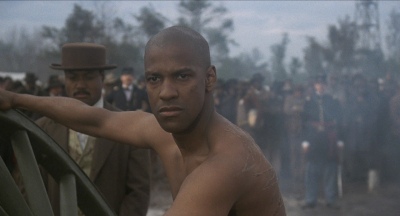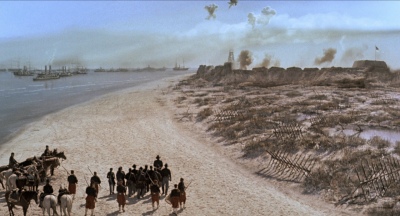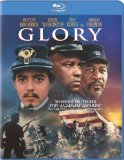| Reviews & Columns |
|
Reviews DVD TV on DVD Blu-ray 4K UHD International DVDs In Theaters Reviews by Studio Video Games Features Collector Series DVDs Easter Egg Database Interviews DVD Talk Radio Feature Articles Columns Anime Talk DVD Savant Horror DVDs The M.O.D. Squad Art House HD Talk Silent DVD
|
DVD Talk Forum |
|
|
| Resources |
|
DVD Price Search Customer Service #'s RCE Info Links |
|
Columns
|
|
|
Glory
Sony Pictures // R // June 2, 2009
List Price: $28.95 [Buy now and save at Amazon]
The history
books I grew up with seemed to paint the Civil War as a conflict between an enlightened North that found itself pitted against an obstinate, barbaric South. This wasn't at all the case, however; prejudices against blacks were often no less stifling and pervasive north of the Mason-Dixon line. The 54th Massachusetts Volunteer Infantry Regiment -- among the first officially recognized black units to enter the fray -- struggled nearly as much against racism and an altogther indifferent Union as they did against the Rebs. Under the command of young, inconfident Col. Robert Gould Shaw (Matthew Broderick), the 54th was dismissed as a novelty that would never see the frontlines. Not only denied arms and even uniforms for an inordinate amount of time, it demanded a colossal effort to fit the men with shoes and socks, and rather than be paid a soldier's wages, these men were denied what they were promised and offered instead the shamefully low rate for black laborers. These soldiers threatened to lose everything -- their freedom and their lives -- to maintain the union, and they were rewarded with sneers, beatings, and condescension.
The central conflict of Glory isn't North versus South. Much of the film is spent delving into the lives of these men as they're trained, with seemingly no end in sight, into becoming soldiers. Though the 54th was a sprawling regiment, Glory focuses most intensely on four of them: a wise, aging gravedigger named Rawlins (Morgan Freeman), the brash and bitter escaped slave Trip (Denzel Washington), the stuttering, wide-eyed innocent Sharts (Jihmi Kennedy), and Searles (Andre Braugher), an educated free man and lifelong friend of Col. Shaw's. Glory follows them as they suffer through both the debasement from the inescapable racism around them as well as the grueling training to become soldiers, only to find that their reward is to meander around and seemingly never be sent into battle. Shaw too isn't certain how to approach the men around him, kept at a distance by his rank and race as well as the haunting memories of the Battle of Antietam. When the 54th is dispatched, it's to carry out menial and at times morally repugnant missions, but they're soon offered a chance to prove themselves in the heat of battle as the Union prepares to mount an assault on the impregnable fortress of Ft. Wagner.
Though Glory is almost universally revered, I'll admit that my feelings are somewhat mixed. Glory's most glaring misstep is its misplaced emphasis on Colonel Shaw. For a film about a black regiment risking everything to prove themselves in battle yet forced to struggle instead with prejudice and dismissal in the North, the film's focus is too frequently lopsided in favor of its white officers. The most intriguing characters and certainly the most startling performances are all from its soldiers, and yet they're forced to give way to accommodate the woeful miscasting of Matthew Broderick. It's explained in the disc's audio commentary that Broderick was cast because Shaw is a man so hopelessly out of his depth, and the actor by design brings to him a youth, shakiness, and inconfidence that fits the part. Broderick cannot, however, convincingly assert himself as much of a leader. When he raids the quartermaster's office seeking shoes for his men, for instance, Shaw is meant to snarl with indignation, but his line readings are instead so stilted and awkward that they immediately took me out of the movie. Broderick is well-suited to representing Shaw's vulnerability and determination to prove himself worthy of his rank, but one never gets the sense that this is a man any reasonable soldier would follow unwaveringly into battle. The acting bleeds through too distractingly -- Broderick can't even maintain an accent, let alone an entire performance -- and Glory suffers for it.
Though
much of the supporting cast is saddled with archetypes, their performances elevate the material and are responsible for Glory enduring such as it has over the past twenty years. Morgan Freeman is, as ever, a standout, serving as the patriarch of this exceedingly young regiment. Glory marks the feature film debut of Andre Braugher, and he makes an immediate impression portraying a free man whose bright-eyed idealism fades away as he's steeled into a soldier. The breakout performance, though, belongs to Denzel Washington. Already an Academy Award nominee but still a relative unknown at this stage in his career, Glory is the film that would propel Washington to stardom. In a smolderingly intense performance, Washington draws Trip as an escaped slave who's been repeatedly beaten down time and again yet refuses to yield. While the other soldiers and officers are unable to look any further in their futures than some glimmer of glory on the battlefield, Trip's gaze soars past that, and all he sees is uncertainty. His arc -- setting aside his bitterness at his lot in life and settling into a larger group -- is the most convincing and compelling in the film, and it's Washington's remarkable performance that's largely responsible for Glory being as celebrated as it is today. It's telling that in a film with several sprawling, harrowing battle sequences, it's the sight of Trip being unjustly whipped -- witnessing that combination of fury and utter degradation -- that makes for Glory's most haunting and arresting moment.
The craftsmanship on every level is impressive. This is a film that was meticulously researched and is much more faithful to the historical record than most, and every frame showcases Edward Zwick's attention to detail. His ambition and the scale of this sort of Civil War epic tower over its $19 million budget, and it's astonishing to witness what Zwick and his immensely talented crew were able to accomplish with such a modest sum. The battles in particular are dazzlingly well-executed. While too many other films of this scope tend to reduce warring factions to indistinct swarms, Zwick maintains both the large scale and the intimacy. These are armies clashing, yes, but they're men -- individuals -- on both sides as well, and Glory never loses sight of that. The battle sequences are unflinching in their brutality, making the unwavering determination of the 54th that much more harrowing that they'd witness such horrors yet march steadfast into the hells of war. Glory also boasts one of James Horner's most revered scores, though I'll admit to finding it somewhat intrusive at times, too heavily underlining some moments that perhaps would've been better suited to resting on the strengths of the performances instead.
Though my reaction to the film is admittedly more mixed than most, its flaws do little to deflate just how rousing and intensely powerful Glory remains twenty years later. Its story of heroism and steadfast determination in the face of such dehumanizing odds -- a film that shines a light on an underrecognized chapter of our past and may spur younger viewers on to further explore the rich tapestry of American history -- demands to be experienced at least once. Recommended.
Video
Glory isn't especially dazzling in high definition -- contrast tends to be rather flat, and the 1.85:1 image is softer than most -- but this almost certainly dates back to the original photography. Modest though they may be, clarity and detail are a marked improvement over earlier DVD releases, and this transfer is free of any wear or speckling. The understated palette of Freddie Francis' Academy Award-winning cinematography is faithfully preserved on Blu-ray, and the film's grainy texture shows no sign of being smeared away through excessive noise reduction. This dual-layer Blu-ray disc offers Glory's AVC encode plenty of room to breathe as well. As I found myself drawn further and further into Glory, the mild softness seemed to fade away. I'd imagine most viewers who enter the film with reasonable expectations ought to be pleased.
Audio
Glory is bolstered by a terrific 5.1 remix, presented here in a lossless 16-bit Dolby TrueHD track. From the devastating battle that opens the film, Glory immediately showcases the ferocity of this mix: rifles and cannonfire attack from every direction, the surrounds flesh out the roar of advancing armies and a torrential downpour, and James Horner's soaring score envelops the room. It's a remarkably immersive soundtrack that benefits further from a remarkably healthy low-end. Slews of explosions and the constant crack of musket fire in particular coax a hefty kick from the subwoofer. The bass doesn't resonate in quite the same way a more recent film likely would, but for a movie ringing in its twentieth anniversary, it's far more substantial than I would've expected. No, the mix doesn't entirely belie its age; much of the dialogue and certain scattered sound effects are flat and dated, and I spotted one nasty crackle in the left surround channel leading up to the film's climax. Still, it's quite a strong effort, all things considered, and befitting of a film whose sound mix was nominated for an Academy Award.
TrueHD tracks are also offered in French and Portuguese alongside a Dolby Digital dub in Spanish. Glory features subtitle streams in English (traditional and SDH), French, Spanish, and Portuguese.
Extras
The Final Word
As pronounced as some of its flaws now seem to me, Glory remains a stirring and powerful Civil War epic, celebrating a chapter of American history that for too long went unrecognized. Recommended.
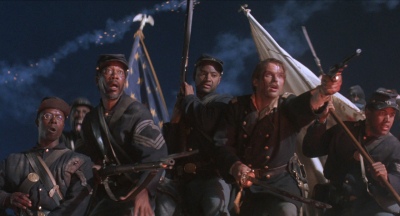 |
| [click on the thumbnail to enlarge] |
The central conflict of Glory isn't North versus South. Much of the film is spent delving into the lives of these men as they're trained, with seemingly no end in sight, into becoming soldiers. Though the 54th was a sprawling regiment, Glory focuses most intensely on four of them: a wise, aging gravedigger named Rawlins (Morgan Freeman), the brash and bitter escaped slave Trip (Denzel Washington), the stuttering, wide-eyed innocent Sharts (Jihmi Kennedy), and Searles (Andre Braugher), an educated free man and lifelong friend of Col. Shaw's. Glory follows them as they suffer through both the debasement from the inescapable racism around them as well as the grueling training to become soldiers, only to find that their reward is to meander around and seemingly never be sent into battle. Shaw too isn't certain how to approach the men around him, kept at a distance by his rank and race as well as the haunting memories of the Battle of Antietam. When the 54th is dispatched, it's to carry out menial and at times morally repugnant missions, but they're soon offered a chance to prove themselves in the heat of battle as the Union prepares to mount an assault on the impregnable fortress of Ft. Wagner.
Though Glory is almost universally revered, I'll admit that my feelings are somewhat mixed. Glory's most glaring misstep is its misplaced emphasis on Colonel Shaw. For a film about a black regiment risking everything to prove themselves in battle yet forced to struggle instead with prejudice and dismissal in the North, the film's focus is too frequently lopsided in favor of its white officers. The most intriguing characters and certainly the most startling performances are all from its soldiers, and yet they're forced to give way to accommodate the woeful miscasting of Matthew Broderick. It's explained in the disc's audio commentary that Broderick was cast because Shaw is a man so hopelessly out of his depth, and the actor by design brings to him a youth, shakiness, and inconfidence that fits the part. Broderick cannot, however, convincingly assert himself as much of a leader. When he raids the quartermaster's office seeking shoes for his men, for instance, Shaw is meant to snarl with indignation, but his line readings are instead so stilted and awkward that they immediately took me out of the movie. Broderick is well-suited to representing Shaw's vulnerability and determination to prove himself worthy of his rank, but one never gets the sense that this is a man any reasonable soldier would follow unwaveringly into battle. The acting bleeds through too distractingly -- Broderick can't even maintain an accent, let alone an entire performance -- and Glory suffers for it.
Though
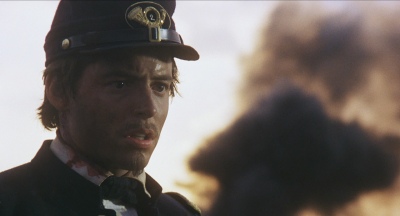 |
| [click on the thumbnail to enlarge] |
The craftsmanship on every level is impressive. This is a film that was meticulously researched and is much more faithful to the historical record than most, and every frame showcases Edward Zwick's attention to detail. His ambition and the scale of this sort of Civil War epic tower over its $19 million budget, and it's astonishing to witness what Zwick and his immensely talented crew were able to accomplish with such a modest sum. The battles in particular are dazzlingly well-executed. While too many other films of this scope tend to reduce warring factions to indistinct swarms, Zwick maintains both the large scale and the intimacy. These are armies clashing, yes, but they're men -- individuals -- on both sides as well, and Glory never loses sight of that. The battle sequences are unflinching in their brutality, making the unwavering determination of the 54th that much more harrowing that they'd witness such horrors yet march steadfast into the hells of war. Glory also boasts one of James Horner's most revered scores, though I'll admit to finding it somewhat intrusive at times, too heavily underlining some moments that perhaps would've been better suited to resting on the strengths of the performances instead.
Though my reaction to the film is admittedly more mixed than most, its flaws do little to deflate just how rousing and intensely powerful Glory remains twenty years later. Its story of heroism and steadfast determination in the face of such dehumanizing odds -- a film that shines a light on an underrecognized chapter of our past and may spur younger viewers on to further explore the rich tapestry of American history -- demands to be experienced at least once. Recommended.
Video
Glory isn't especially dazzling in high definition -- contrast tends to be rather flat, and the 1.85:1 image is softer than most -- but this almost certainly dates back to the original photography. Modest though they may be, clarity and detail are a marked improvement over earlier DVD releases, and this transfer is free of any wear or speckling. The understated palette of Freddie Francis' Academy Award-winning cinematography is faithfully preserved on Blu-ray, and the film's grainy texture shows no sign of being smeared away through excessive noise reduction. This dual-layer Blu-ray disc offers Glory's AVC encode plenty of room to breathe as well. As I found myself drawn further and further into Glory, the mild softness seemed to fade away. I'd imagine most viewers who enter the film with reasonable expectations ought to be pleased.
Audio
Glory is bolstered by a terrific 5.1 remix, presented here in a lossless 16-bit Dolby TrueHD track. From the devastating battle that opens the film, Glory immediately showcases the ferocity of this mix: rifles and cannonfire attack from every direction, the surrounds flesh out the roar of advancing armies and a torrential downpour, and James Horner's soaring score envelops the room. It's a remarkably immersive soundtrack that benefits further from a remarkably healthy low-end. Slews of explosions and the constant crack of musket fire in particular coax a hefty kick from the subwoofer. The bass doesn't resonate in quite the same way a more recent film likely would, but for a movie ringing in its twentieth anniversary, it's far more substantial than I would've expected. No, the mix doesn't entirely belie its age; much of the dialogue and certain scattered sound effects are flat and dated, and I spotted one nasty crackle in the left surround channel leading up to the film's climax. Still, it's quite a strong effort, all things considered, and befitting of a film whose sound mix was nominated for an Academy Award.
TrueHD tracks are also offered in French and Portuguese alongside a Dolby Digital dub in Spanish. Glory features subtitle streams in English (traditional and SDH), French, Spanish, and Portuguese.
Extras
- Virtual Civil War Battlefield (HD): Exclusive to this Blu-ray release is an interactive map that highlights some of the key confrontations throughout the Civil War: Gettysburg, Ft. Sumter, Chancellorsville, The Battle of Antietam, Fort Donelson, The First Battle of Bull Run, and The Battle of Shiloh. Selecting a location reveals details about the significance of each battle as well as a total of 19 minutes of video commentary by several historians. This high definition footage also includes brief comments about both Lincoln and Lee's perceptions of slavery as well as the inevitability of the Civil War and the secession of the South.
- Audio Commentary: The video commentary from one of the earlier DVD releases hasn't been included, but director Edward Zwick's wonderful commentary track has thankfully found its way onto this Blu-ray disc. Astonishingly thorough and refreshingly candid, this conversation with Zwick further expands on the historical backdrop of Glory, a slew of technical notes, and innumerable comments about the performances and production. Among the highlights are working around the limitations of such a modestly budgeted film before the advent of CGI, striving for an approach that's alternately intimate and epic in scale, the slew of re-enactors who volunteered without pay to be a part of the production, and precisely how the complete and total degradation Trip endures was captured. This is a rewarding and essential listen.
- Deleted
Scenes (6 min.; SD): Though the quality's disappointingly poor and the material itself fairly forgettable, two deleted scenes have been included. The first follows Trip, Rawlins, and Sharts as they draw blood for the first time, and the other is a conversation between Shaw and a weary Major Forbes (Cary Elwes). Edward Zwick offers optional commentary that's much more insightful than usual for this sort of footage, noting how inessential the soldiers' kill scene is and that the chatter between the officers represents perhaps the nadir of his career as a director.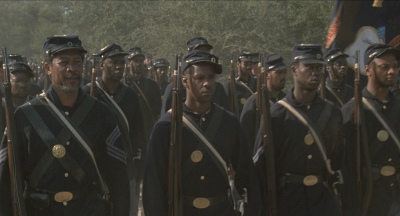
[click on the thumbnail to enlarge]
- The True Story of Glory Continues (45 min.; SD): Narrated by Morgan Freeman, "The True Story of Glory Continues" expands upon the events of the film: Frederick Douglass' role in inspiring blacks to enlist, the impact the 54th Regiment directly had on the course of the war and other divisions to come, the staggering losses and shameful inequities they suffered, and, despite their lack of recognition in Washington at the time, the legacy of the 54th in the many years since.
- Voices of Glory (11 min.; SD): Further exploring the disparity in pay and inescapable prejudice, this featurette also delves into the men of the 54th, and mixed in with its more traditional documentary-like perspective are the recitations of several of the soldiers' letters to their families.
- Original Theatrical Featurette (8 min.; SD): This intensely promotional piece dating back to Glory's original theatrical release is forgettable, alternating between extended clips from the film, lightweight talking head interviews, and a smattering of behind-the-scenes shots.
- e-Movie Cash: Also included is e-Movie Cash -- redeemable via mail or over BD-Live -- for the remake of The Taking of Pelham 1 2 3 starring Denzel Washington.
- Trailers (HD): High definition trailers for a handful of other Sony releases -- Glory not among them -- round out the extras.
The Final Word
As pronounced as some of its flaws now seem to me, Glory remains a stirring and powerful Civil War epic, celebrating a chapter of American history that for too long went unrecognized. Recommended.
|
| Popular Reviews |
| Sponsored Links |
|
|
| Sponsored Links |
|
|
| Release List | Reviews | Shop | Newsletter | Forum | DVD Giveaways | Blu-Ray | Advertise |
|
Copyright 2024 DVDTalk.com All Rights Reserved. Legal Info, Privacy Policy, Terms of Use,
Manage Preferences,
Your Privacy Choices | |||||||









